Alexander & the City of Immortals
Visions of Homer, the Blind Bard of Ionia
HIS OWN precious copy of Homer was safely locked in a golden casket, which he furthermore clutched between his fingers, when Alexander the Great stood along the Egyptian shore. Alexander had in mind a grand city which would bear his name; a Greek metropolis; a philosophical utopia; the spiritual bread and butter of the ancient world—and indeed, Homer had brought him here. His architects and surveyors had already selected another suitable site, by which digging was to begin, but Alexander was just as assuredly convinced that they had settled on the wrong plot of land. The ancient historian Plutarch writes that, while Alexander was sleeping (likely with his copy of Homer stashed under his pillow), he saw a remarkable vision.
Plutarch writes:
“He thought he could see a man with very white hair and of venerable appearance standing beside him and speaking these lines:
“Then there is an island in the stormy sea,
In front of Egypt; they call it Pharos.”
To this Plutarch simply adds, “He rose at once and went to Pharos.”
The divine figure was quoting Homer. Within Homer, and no doubt a thoughtful nudge from his nighttime informant, Alexander had found a treasure map of sorts. And we shouldn’t be surprised by this. In an age enamored with history and beguiled with glory, no single text penetrated the Greek world quite like the poetry of the blind bard from Ionia—modern day Turkey. Even before the child could add logic to their sentences, before he or she could learn to read, their love affair with Homer began. While in school, some of their earliest penmanship lessons would undoubtedly include a pigment on papyri recital: Homer was not a man, but a god. Silent reading was an uncommon habit, whether in public or in one’s private chambers. Homer was therefore a stage performance for its every orator, spoken with the vigor of a Shakespearean actor. For Homer, one might therefore conclude, the world was his stage. He even gave way to the most powerful art of all—philosophy. “His 15,693 lines provided the moral, political, historical, and religious context, the great deeds and the ruling principles, the intellectual atlas and moral compass,” writes Stacy Schiff in Cleopatra: A Life. “The educated man cited him, paraphrased him, alluded to him. It was entirely fair to say that children…nursed in their learning by Homer, and swaddled in his verses.”
The sculptor Archelaus of Priene, living in the decades surrounding 300 BC, depicted Homer as the divinely-inspired reservoir of all literature. In his surviving masterpiece, Homer is flanked by nine muses and their father Apollo, the god of music and poetry, standing alongside a female figure identified as Mnemosyne, the mother of the muses. Zeus, father of gods, stands above the procession in order to contrast the immortal due his honor, Homer, “father of humankind.” Though Canaanite epics and the epic of Gilgamesh stir in our furthest memory, it is Homer and his poems which mark the beginning of our Shakespearian stories.
While the Bible was still being written and compiled in the divided kingdoms of Judea and Israel through the divine inspiration of the Holy Spirit, the blind bard from Ionia, through the divine inspiration of Apollo and his adopted daughter muses, was busy writing his.
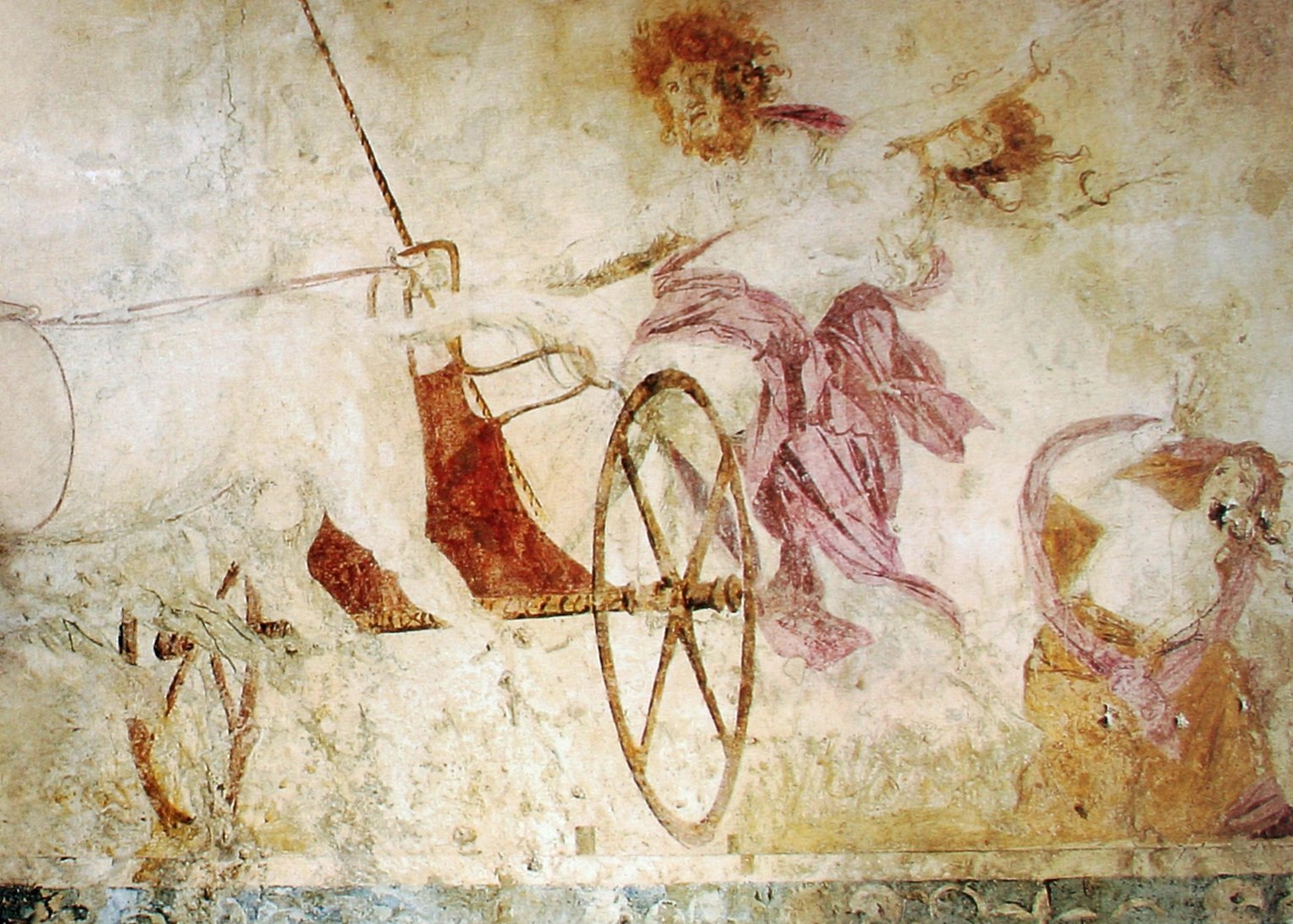
The Soul Lives On in the Fields of Eleusis
“The living are ruled by the dead” — Elysian Neophyte
SHE WAS minding her own business, picking flowers on a spring day, when the young Persephone was brutally raped and abducted by a god. When she didn’t return home, her mother went looking for her. She too was a goddess. As she broadened the scope of her search, Demeter found herself wandering about the entire world, neglecting divine duties as she did so—and the earth suffered. Though the rains had assuredly arrived soon before Persephone’s carefree jaunt through the country, the advent of summer witnessed no grains or wheat. By this we can quickly conclude, not only was all of creation involuntarily punished for want of nourishment, but the gods were too. They were deprived of their offerings. Someone had to give.
It is for this very reason that, having learned of her daughter’s whereabouts in the underworld and imploring her Olympian siblings to demand release, they prevailed over Pluto, its king. There was however a slight complication. The naive Persephone, negligent as to the health of her own soul, had eaten of the forbidden fruit—six pomegranate seeds, in fact. Consequently, Persephone was liberated on one condition; that she must return in Pluto’s company every year for six consecutive months. Though Demeter undoubtedly delighted in her daughters’ presence throughout the remaining year, her annual sojourn resulted in inconsolable mourning. The harvest was plentiful, but come autumn, the earth once again fell into neglect. That is to say, whenever Persephone is returned to Pluto, winter falls upon us.
The Homeric Hymn to Demeter, written in the same heroic verse as the Iliad and Odyssey, and which was historically accredited to Homer himself, may be one of the most important poems ever written, despite the fact that it is rarely recognized by the educated soul today, and even less discussed. But the story before us, essentially, at its most primal level, is the groundwork for the ancient Eleusinian mysteries. Named for the community in Attica where the sacred dramas were first presented, the Eleusinian mysteries captivated not only neighboring Athens, but the entire Greek speaking world for nearly two-thousand years.
The world of Homer consisted of but few men who could hope to attain the sort of godlike stature which his players were attributed to. Likewise, immortality was beyond their grasp—certainly not spoken of the self. It is Homer however, the blind bard from Ionia, who would extend the offer of self-salvation to humanity as an advantage of initiation.
That the soul is immortal—that immortality might be grasped within each and every neophyte—this is the Eleusinian mysteries and the Mystery religion as a whole.
There is an interesting passage in Hymn to Demeter where Demeter is prevented from transforming the mortal child Demophoon, a grain god, into an immortal soul—perhaps in hopes of undoing the mess in which the natural world had found itself, due to her haphazard grief. Her inability to perform the deed is relegated upon the fact that the child’s mother screams in protest, having witnessed Demeter attempting to immerse her boy into a stew of flames. If Homer’s subplot hinted at or sought to provide commentary on the widespread act of passing children through the fire in surrounding Mystery rites, sacrificially speaking, and that it was ultimately a means of immortalization, we are left with an unanswered riddle.
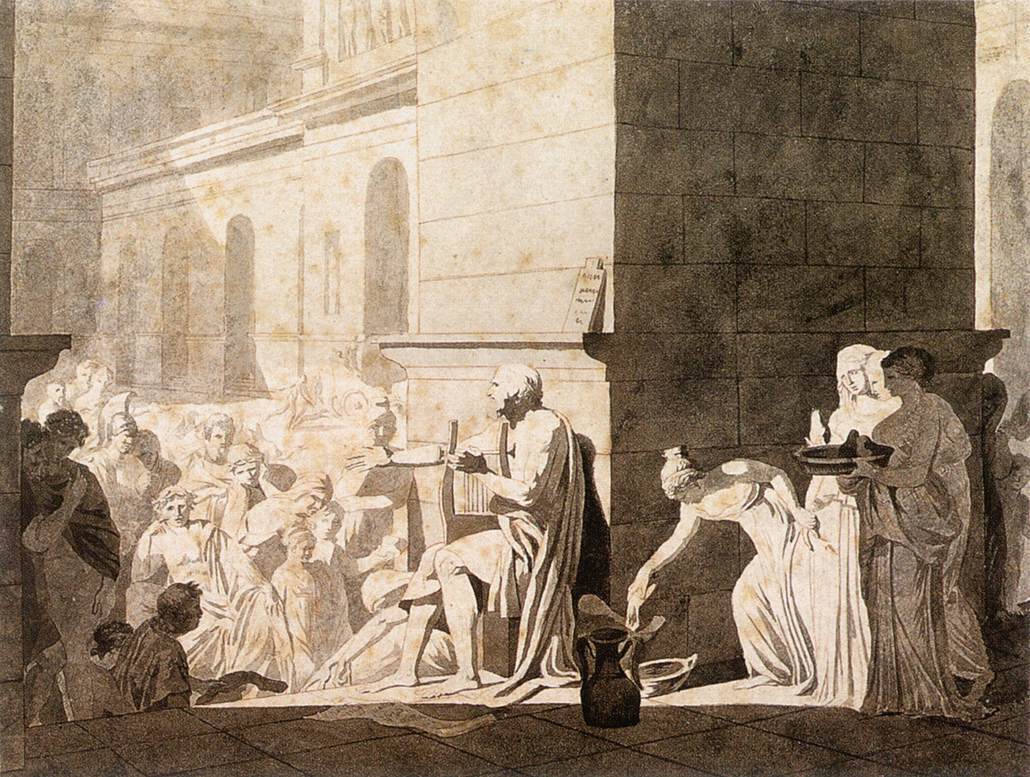
It is frequently commented upon by historians in every generation and rank that the Mysteries today still maintain, rather ironically, a cloak of mystery, despite her widespread practices in practically every human culture, and over multiple millennia on either side of Christ’s birth.
Well, let me rephrase that. We uninitiated do not know.
Surely, somebody knows.
The fact remains, since the Eleusinian mysteries were courted with zipped-lips, with secrecy being held in the highest regard, no initiate openly spoke of them. Her secret rites were enacted with a spacious and rectangular, windowless structure near a cave believed to be the entrance to the underworld. The telesterion, as it was called, was designed for the purpose of darkly-lit, perhaps pitch-black showmanship, most likely for the purposes of a spiritual rave, complete with pyrotechnics. Aristotle said of the mysteries that the initiate did not learn anything academic during such initiations but rather experienced the mysteries in such a way as to alter their state of mind. The philosopher was no doubt referring to the barley brew exchanged between its participants, called the kykeon, and anyone’s best guess is that the cup was ramped with psychedelics.
It is probable that the Eleusinian held to third-eye principles—that his or her soul left the body during sleep, or more specifically, was made capable of lifting into the higher plane by the special training they received. Today we know this as astral projection. Many initiates, perhaps while feeling their way through the other side of darkness in the telesterion, claimed to have actually seen the living gods themselves.
Rather than acquiring outright philosophical knowledge, rites of Eleusis promised to deliver Nature’s most mystic and precious secrets—that is, acquiring the free gift of salvation first promised to us through the providence of divine beings. From Demeter we derive Mother Earth. The soul of man, symbolized by Persephone in the Homeric poem, finds “its true home in the higher worlds where, free from the bondage of material form and material concepts, it is said to be truly alive and self-expressive,” writes Manly P. Hall in The Secret Teachings of All Ages. “The human, or physical, nature of man, according to this doctrine, is a tomb, a quagmire, a false and impermanent thing, the source of all sorrow and suffering.” Though perhaps not outright philosophical knowledge of the divine, philosophical it would most certainly become—and more so, an entire world view. The Eleusinian mysteries were later vaulted by Platonism with such indiscretion that her principles, even her involuntary initiation, is available to all in modern times.
Besides, Persephone and Demeter can easily be attributed as a retelling of the Descent of Inanna in ancient Sumerian literature. “In some way,” writes Alan F. Segal in Life after Death: A History of the Afterlife in Western Religion, “we keep coming upon the same naked narrative structures, each time newly dressed in the interests of a new culture.” Then again, if the Mysteries of Demeter and later Bacchus, her Mysteries competitor, suspiciously compare with the rites of Isis and Osiris in Egypt across the Mediterranean, we shouldn’t be surprised. They all relate to the Garden of Eden; the forbidden fruit; the Watchers of Enoch. Manly P. Hall assures us, “there is every reason to believe that all so-called secret schools of the ancient world were branches from one philosophic tree which, with its root in heaven and its branches on the earth, is—like the spirit of man—an invisible but ever-present cause of the objectified vehicles that give it expression. The Mysteries were the channels through which this one philosophic light was disseminated; and their initiates, resplendent with intellectual and spiritual understanding, were the perfect fruitage of the divine tree, bearing witness before the material world of the recondite source of all Light and Truth.”
Quite contrarily for the unititate however, those who forsook entry into the telesterion and beyond, there was no hope. The gods had afforded a way. So when the gates of Hades opened wide for them, if they had put off their neophyte journey for a later date, or altogether rejected the offer, they were on their own.
In the Hymn to Demeter Homer wrote:
“Happy is he among men upon earth who has seen these mysteries; but he who is unititate and who has no part in them never has a lot of good things once he is dead, down in the darkness and gloom.”
For the Mystery school initiate, death itself was regulated to a rebirth—a rejoining with the gods in the firmament above. Plutarch dipped his pen into the parchment of the Mysteries in order to describe the moment of death when he wrote:
“The soul suffers an experience similar to those who celebrate great initiations… Wandering astray in the beginning, tiresome walkings in circles, some frightening paths in darkness that lead nowhere; then immediately before the end all the terrible things, panic and shivering and sweat, and amazement. And then some wonderful light comes to meet you, pure regions and meadows are there to greet you, with sounds and dances and solemn, sacred words and holy views; and there the initiate, perfect by now, set free and loose from all bondage, walks about, crowned with a wreath, celebrating the festival together with the other sacred and pure people, and he looks down on the uninitiated, unpurified crowd in the world in mud and fog beneath his feet.”
This is the very crux of the Eleusinian argument and precisely how Plato would later describe the body. Flesh and bones are a sepulcher of the soul. His very being, his physicality and nature, is nothing more than a sarcophagus. To the Eleusinian, birth into the physical world is death in the fullest sense of the world. Divine wisdom contained in the stars is likewise lost to us. If the soul does not rise above ignorance, if he does not acquire the hidden knowledge of his divine self, then he will be delivered over to eternal agony, being incapable of gratifying the desires of his sepulcher-self.
The Gnostics, as well as such classics as Dante’s Inferno, would pick up where the Mysteries left off, wrapping them up with sparkling paper and a bow for the Roman Catholic Church.
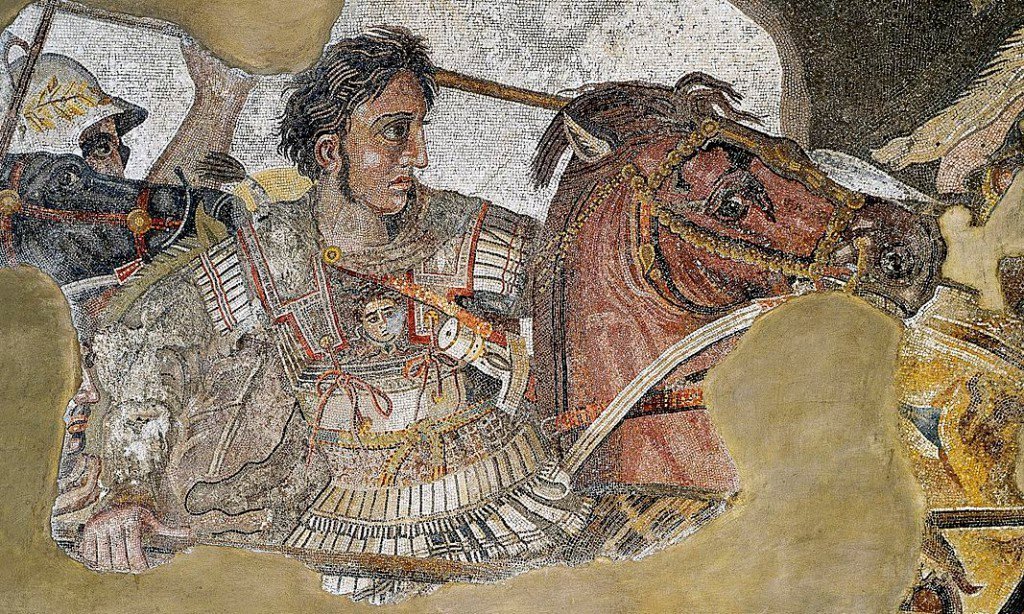
Alexandria, Spiritual Bread and Butter of the World
ROME WAS little more than a village when Philip II of Macedonia went to war with the Persians. The year was 336 BC. In turn, Darius III had the king of Macedonia assassinated. He would come to regret that decision. At just twenty years of age, his son began the most remarkable military career in human history. Within three years—at the battle of Issus in 333 BC—Darius was defeated. He fled, leaving his mother, wife, and children behind as trophies of Alexander’s spoil. It is in the kings golden casket, also abandoned during his plight, in which the Macedonian placed his beloved copy of Homer.
The following year Egypt was liberated. Alexander was welcomed with arms open so wide that, at the age of twenty-three, they crowned him their king. Alexander had inherited a wealth of esoteric knowledge—the very astronomical, mathematical, alchemical, and spell-binding books of spoken verbiage which had attracted Pythagoras and Zoroaster in recent centuries. Some one-hundred years before his arrival, her mysteries had invited Herodotus too. The historian observed of his own visit: “There is no country that possesses so many wonders, nor any that has such a number of works that defy description.”
By all accounts, Egypt was a land of mystical wonder and conundrums. The life-giving river Nile, seemingly defying logic by flowing backwards, south to north, and furthermore reversing the known laws of nature by swelling in summer and subsiding in winter, gave testimony to her Mysteries—of her cyclical birth and death and annual re-birth. Consider that the pyramids were as comparatively old to Alexander as the birth of Christ is to us—perhaps even older. Even then they were an enigma to the young king. Essentially, like a dreaded crocodile submerged within the Nile, Egypt could effortless leap forth and gorge Greece’s library of knowledge and history in one swift swallow. There was no shortage to the wisdom which her gods and goddesses might offer. Herodotus had said that the Egyptians were the most religious of all peoples, and their beliefs imbued every element of their society. Then again, Egypt was a country so backwards, Herodotus added with a flourish of sarcastic salt, that “the women urinate standing up, the men sitting down.”
To the Egyptian, divorcing magic from religion was unthinkable, and clearly, Egypt exercised her spells. Perhaps it is true that Alexander alone was drawn to her abracadabra—he and very few others. Egypt was populated by an insular and inward looking people. The Mediterranean did not cast her gaze—but the rites of the Nile. Likewise, few were invited in. The Mediterranean however, not the Nile, bound Alexander’s world together. He needed a city to supply his army and control the world’s first empire. But now, standing along the Egyptian shoreline with the island of Pharos neatly tucked away behind his back, birds descended on his men as they laid barley flour on the sand—perplexing indeed. This may prove a bad omen. Alexander’s personal soothsayer, Aristander, was not concerned. He said it simply showed that Alexandria would one day feed the whole world. When Alexander consulted the Egyptian gods himself on the matter, they mutually agreed.
“The city you are building,” they said, “will be the food-giver and nurse of the whole world.”
There is a story told by the Jewish historian Josephus which involves Alexander’s arrival in Jerusalem. His visit with Levite priests was clinched with a briefing from the Prophet Daniel, whereas Alexander was shown the scroll and read about himself. “And when the book of Daniel was shewed him,” Josephus asserts, “wherein Daniel declared that one of the Greeks should destroy the empire of the Persians, he supposed that himself was the person intended; and as he was then glad, he dismissed the multitude for the present …” Essentially, Alexander was one of history’s foremost prototype antichrist figures. As Daniel’s he-goat, he recognized this fact and approved.
The gods of Egypt did not mince their words. Though Isis—divine goddess, mother earth and queen of heaven—had prospered an inward-gleaning providence, histories great prototype antichrist would wrap Egypt, and her spellbinding charms, not only as a gift to the Greek speaking world, but the whole of human history.
The man who claimed to have traced his heritage from a character in Homer’s Iliad would not return to see his grand vision for humanity. It is for this reason—his lineage with Achilles, that Alexander believed his destiny would be a narrative on par with Achilles in Troy. He did not disappoint. While Darius died, Immortal Alexander gave him his last drink of water. In turn, Daniel’s he-goat succumbed to his own death in June of 323 BC, in Babylon, at 32 years of age, having convinced himself that he was not truly the son of King Philip II, but the son of the omnipotent Greek god Zeus.
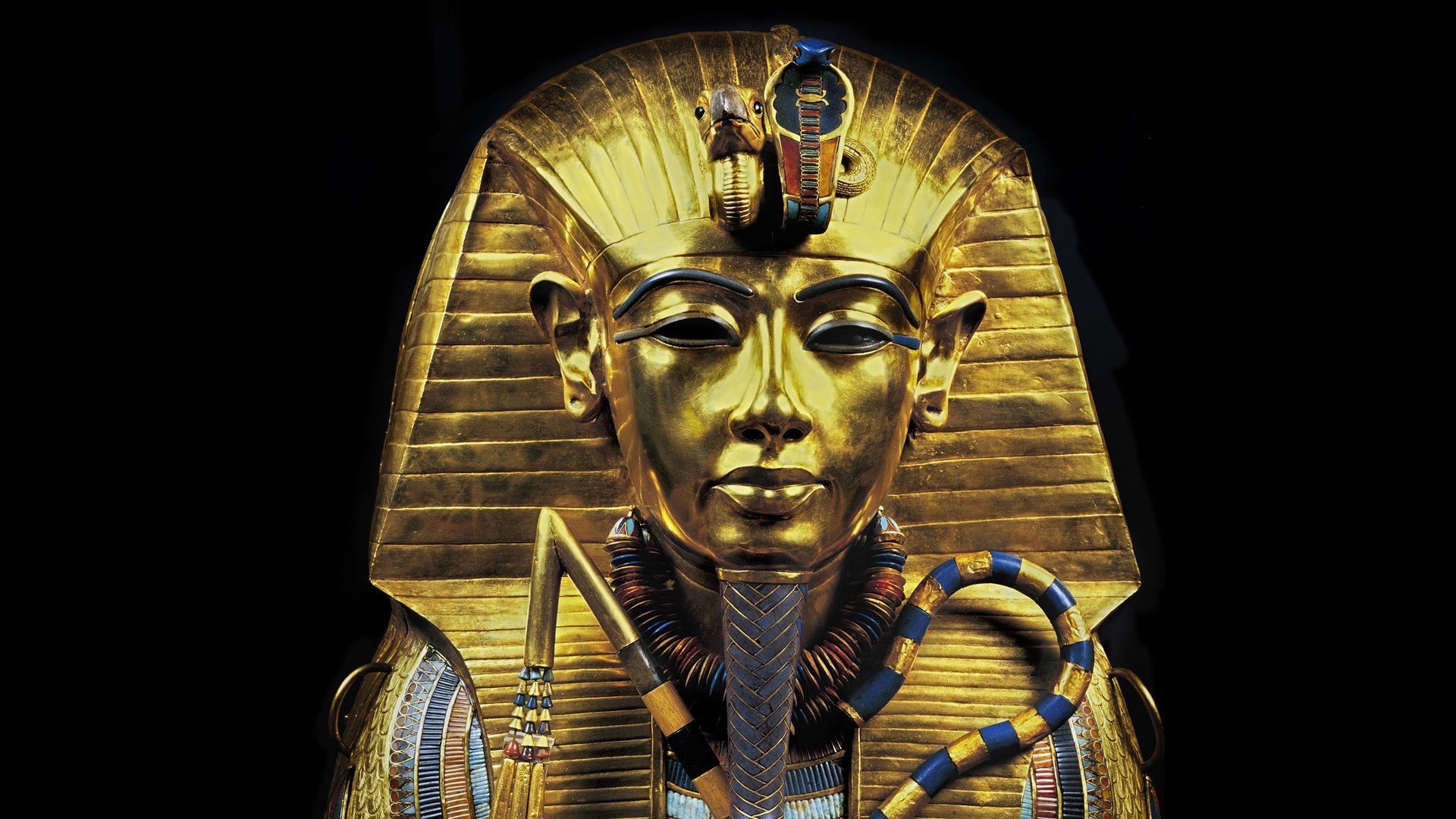
Pharaoh, Avatar of Egypt, and His Household of Ascended Masters
THE AGE of Hellenism inevitably brought the cult of Demeter at Eleusis to international fame. The Eleusinian mysteries were so well-financed and world renowned that other religions explicitly rebranded themselves through the efforts of her initiates. This is of course the overarching narrative of Hellenism. Hellenism conquered practically every belief system of the old world. Even the ancient Egyptian cult of Isis caved, and that speaks volumes.
Initially, the sky, Nut, was a woman, while the Earth, Geb, was a man. The Egyptian word for sky is likewise feminine with the earth filling in the masculine. This in itself contrasted practically every religion on earth, most of which depicted the sky with fatherly attributes and the earth as something motherly. But the sky brought too little rainfall. Agriculture was delivered by the annual flooding of the Nile, with its influx of mud, and in a reverse order which simply defied all other seasons on earth. For this reason many early Egyptian myths pictured creation as a big bang event of sorts, a surge of fertility, but accomplished through the masculine and unmistakably magical act of divine masturbation. Such conjuration was a particular favorite of Aleister Crowley and Jet Propulsion Laboratory founder Jack Parsons.
The Egyptians held to a watery chaos which existed before material creation. It is Nut, the sky goddess, outer space, who holds back the anarchic current of the raging cosmos above, through which its blue waters can be seen by day and the celestial deities she has birthed by night.
Nut’s symbol was a water pot.
While wandering through the wilderness, the Hebrews would strip away pantheism and simply call this the firmament.
Among her abundance of ancient histories, the Egyptians did not speak in the vocabulary of being saved or damned. They distinguished between a transfigured person of high pedigree in the afterlife, or the akh, and the only available alternative. To be a mut was the same as to remain a corpse. Mut, muth, or mooth is derived from a Semitic root, frequented in both Arabic and Hebrew, and simply intends death. Egypt insisted that one simply died forever—that is, unless he was initiated.
The word Pharaoh is actually a Greek word, rather ironically, and though it signifies the ruling king of Egypt, it also denotes great house. For thousands of years it was Pharaoh’s household, his pantheon of divine beings, the ruling class, who returned to their immortal status in Nut’s womb after death. For this reason Egypt’s Pharaoh was both Osiris and Horus, serving the role of two different sequential avatars. While on earth he enacted the part of Horus, and upon ascending to the heavens, Osiris. For the great household, life continued. Nut’s promise to him and his house was that death has been denied.
“Rise up,” she says, “for you have not died.”
It is in the heavens where he was expected to survey the earth each day. His tomb—the ka, as they called it—was not simply a tomb. The ka could also dwell with him in the sky. Together they interlinked both avatars.
“Open up your place in the sky among the stars of the sky for you are the Lone Stars,” says Nut to her princes.
Furthermore, a living pharaoh might proclaim, “My father has not died the death, for my father possesses a spirit in the horizon.”
Despite Egypt’s multitude of mummies, consider her millions of souls who were not born of pedigree; not of old money; uninitiated; hieroglyph illiterates; without a tomb and the magical rites associated with mummification to preserve them; who simply died and perished. And then consider the Hebrew writers. To say they forbade the magical rites of mummification is an obvious conclusion to make, but in the same token, they were simply uninterested in any notion of the afterlife. Job made this point abundantly clear. The Prophets followed suit. Their covenant initially had nothing to say about the afterlife, certainly nothing of duality, except to warn against believing that another god could supply one. Yahweh alone held the ritual rites to resurrect a righteous people who were not restricted to a ruling household or hush-hush initiate. He would perform the miracle in His timing—specifically, at the end of time.
Yahuah’s covenant with Israel delivers an absolutely unique signature among the various scripts in the cultures surrounding them, often plagiarized, “and especially strange in the ancient Near East,” writes Alan F. Segal, “where elaborate ideas about postmortem existence and even more elaborate rituals were everywhere part of literature, myth, and social life.”
But the Egyptians, desperate to throw off the yoke of Persian rule, would recognize the Hellenization which Alexander, their new welcome Pharaoh, provided, particularly within the city which he founded. The Ptolemaic dynasty would see to it for another 275 years. Like the darkened telesterion and the sunlit Eleusinian fields often discovered within them, the Egyptians would open up the rites of Immortality to all who wished to partake in the Mysteries of Isis.
So also would the Hebrew faith, in time, flounder to Alexander’s antichrist religion, to the mysteries of Demeter, to Isis, her Egyptian counterpart, and the human liberty her providence promised to bestow upon all mankind, apparently as a natural elohim given right.
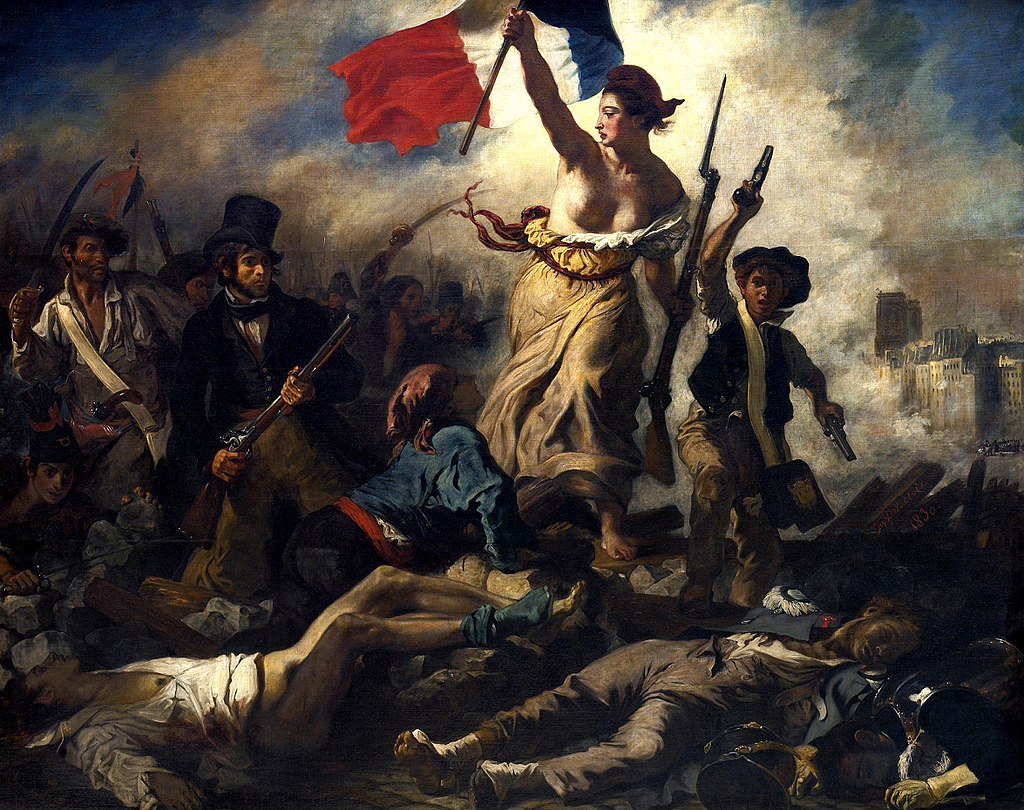
Do We Look Upon History as History Looks Upon Us?
THOUGH IT is true that there is much we do not know of the past, the same can be said of the ancients—there is much they did not know of themselves. While the Macedonian king advanced towards ancient Babylon, he couldn’t have possibly comprehended that time as we know it today was in reverse; that the calendar years were winding down in a backwards fashion, like the upwards compartment of an hourglass or the river Nile, flowing seemingly against the laws of nature, while we presently gaze back and trace a finger with an exuberant anticipation of the Jewish Messiah.
He did not have any recollection that the blind barge of his poetic passions was from an archaic age, that he was the last born generation of the classical philosophers, nor could he have possibly imagined that a nineteenth century German scholar by the name of Johann Gustav Droysen would be the first to designate such terms as the Hellenized age in order to describe his sphere of influence. Though it would likely not surprise Alexander in the least, and would surely please him to learn that his world tour was a baton race of sorts, except that he alone was handing off the torch of inner enlightenment from one epoch to another.
Still, history—much of history—has recorded its actions for the inquisitive ear, and there are scads which they knew of us but we refuse to know of ourselves. Certainly not to disappoint us, as the great archetypal antichrist figure that he was, Alexander rescued humanity from a Classical age of few Mystery initiates to one in which immortality was freely delivered to all.
Very few of us in the church today have come to acknowledge, or rather fathom and equally appreciate a total distaste, more-so revulsion for Alexandria’s produce. It is in Alexandria where, not surprisingly, the first recorded atheist philosopher, Aristarchus of Samos, would put the earth in motion with the heavens above, thus giving birth to heliocentricity. It is likewise in Alexandria, from the forty-story Pharos island lighthouse dedicated to Zeus, where the strange phenomenon of ships disappearing over the horizon was observed and debated. Apparently, the Alexandrians discovered a globular horizon. As a successor of Theophrastus at the Academy in Athens, who in turn was Aristotle’s successor, Eratosthenes would follow in the footsteps of Aristarchus by seemingly attempting the impossible. It is there where Eratosthenes measured the breadth of the earth using only a stick and a well. Afterwards, he not only measured the depth of the heavens, but flipped the earth on its axis. Some centuries later, through the constantly changing positions of the celestial bodies and Ptolemy’s observances of them—mainly his proposal that a continuously fluctuating atmosphere incited a response from and change of fortune for all living creatures—a new and long-enduring brand of astrology was religiously instituted.
Alexander’s gift would bring to us the Hellenized rendering of Holy Scripture through the Jewish philosopher and mystic Philo, and not so long thereafter, the first Christian academy—the Catechetical School of Alexandria, under the guidance of Clement and Origen, so that the church today might be masked, unknowingly, with the blinders of Platonic doctrine. Because of Alexandria and her assortment of initiated wizards we blindly believe the immortal soul doctrine. It should come as no surprise then that she would nurture the pestilence of Gnosticism; mold the battleground between hidden knowledge and Christianity, of which Hypatia, Queen of the Occult, would take the reins—and in doing so attempt once more to advance heliocentricity for the Copernican to come. As the sun finally set on Alexandria, while giving simultaneous rise over Rome, the Egyptian city would antagonize the church with the Arian heresy—thus prompting the council of Nicaea.
But even then, despite her waning hours, men would smell the bouquet of her embalming spices and take delight in her corpse. Time and time again, she would see to it that her body was exhumed.
It is in Alexandria where alchemy, in its constant quest for immortality, had been rendered into a communicable, though secret, code. Among her excavations, a person by the name of Hermes—the most mysterious figure in Alexandrian history and the person responsible for her alchemical canon—could once more enlist his age of Enlightenment pupils. There Isaac Newton would dip into his occult studies and, with Jewish mysticism to back him, discover the occulting principles of gravity. For Helena Blavatsky, Alexandria would deliver from her womb Ammonius, father of Theosophy.
Indeed, the Alexandria’s knew much about us, our preconceived and eternally gullible notions of reality, that we often fail to recognize ourselves. But despite Alexandria’s total disregard for a world propagated solely through Biblical authority, her HTD’s were far from through and even now, I suspect, is not short of surprises. Much later on—not so long ago, from our current grasp at the horizon—her ghosts would secure a partnership between Westcott and Hort, a contemptible and unholy pairing who would, quite astonishingly, make a recently discovered Alexandrian Manuscript, the Codex Sinaiticus, the standard New Testament text and most cherished reading in modern Christendom; despite the fact that it is, provably, the worst and most disagreeable manuscript in Biblical antiquity. That her sister city was Pergamum, the seat of Satan, is rarely deliberated nor understood. The fruit of Alexandria is rotten indeed.
It is in Alexandria where we may find the most sinister and widespread, though cleverly hidden, offering in our world (or rather, entree of reality) today—the Mysteries of Isis.
An estimated 12 million immigrants entered the United States through Ellis Island, neatly tucked within the Upper New York Bay by the Hudson, from 1892 until 1954—a total span of 60 years. That is, 12 million souls who gazed upon Lady Liberty as they passed, almost ceremoniously, into her providence. If only they knew it is Isis, standing as an emblem for Manhattan, who delivers liberty and enlightenment for the people of her government. 20 million tourists visit Washington DC each and every year. That is, 20 million souls who admire the Washington Monument, almost ceremoniously, for the providence it represents. If only they knew it was a testament to the love and devotion towards Horus, her son. Over 300 million Americans possess a 1-dollar bill in their pockets. Cleanly depicted on the backside of their dollars, the eye of Horus, also known as the eye of Providence, fills the missing capstone over Giza’s great pyramid. If only they knew.
Another 1 billion Catholics celebrate Christmas each year. The Madonna with child whom they worship, Mother of God and Queen of heaven, is a nothing more or less than a cleverly disguised Isis, Mother of God and Queen of heaven, holding the artifact of her own immaculate conception—Horus. If only they knew.
Yahweh once commanded of Moses that he stretch out his hand toward the sky, towards Nuit, realm of the divine and the Egyptian immortals, that there may be darkness over the land of Egypt. It would be the sort of darkness, the one God of Israel stressed, which could be felt. For the Hebrew, theirs was a spiritual slavery, as well as physical—one in which their heartfelt cries reached to Yahweh in heaven, and He remembered them.
Alexandria isn’t simply relegated to the dusty boots of archeologists. The Mysteries of Isis are alive. If only my brothers and sisters in the faith could feel the pitch of her providence, the blanket of her darkness, stretched across our land.
Noel
